by Muzammal Hussain
Edge, ecosystems and cultures
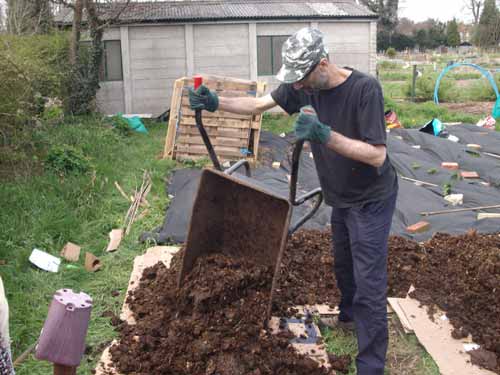 The edge, in permaculture, is the meeting place between two ecosystems. Containing elements from both, the edge is a place of enhanced diversity and richness.
The edge, in permaculture, is the meeting place between two ecosystems. Containing elements from both, the edge is a place of enhanced diversity and richness.
The edge also exists, as I learnt on my Permaculture Design Course, in the social realm. For example, when two groups, or cultures, come together, this too can be a place of richness. Ideas are shared, and may more readily evolve. Something new may be born, a new art form, new music or unique creative endeavour.
Simultaneously, a social edge can also be an area of tension - especially when spaciousness is restricted within the interactions between the two groups.
Most of us will have experienced some kind of social edge in our lives – and we may have felt it even more acutely when we’ve been of a minority.
One of the places I’ve experienced the social edge, fortunately in mostly positive ways, is through my being a practitioner both of permaculture and also of Islam. I’ll share more on that soon but first here’s a very brief background about the evolution of my relationship with Islam.
Religious edge
I was brought up a Muslim, and my relationship with Islam was initially quite passive.
In my late teens, I began to also explore other traditions and practises, particularly Vedic teachings through my being initiated in transcendental meditation, a practise that opened my eyes to the inner dimension.
A few years later, I re-engaged with the Islamic tradition, but in a more conscious way than previously. I had also developed much respect for other traditions, and continue some of their practises within an overarching Islamic framework.
Something called permaculture
It was during this period of exploring other spiritual traditions, in the late ‘90s, that I became active in ecological campaigning. My activities also led me to hear of something called ‘permaculture’.
Although I still wouldn’t have been able to say what it was, I continued to hear more about permaculture through friends or fellow activists. Their comments were always strikingly complementary. At some level I was beginning to understanding permaculture as a way of pursuing solutions through knitting things together. It seemed like something that was holistic, and that you did slowly - rather than clumsily rushing in to bulldoze through a big change.
There were other qualities that I also began to associate with permaculture: earthiness, humanness, collaborative, small scale, and through hearing about the Earth Activist Training, permaculture seemed to offer a way for change-makers to create regenerative systems while also campaigning against powerful forces that were perpetuating a degenerative world.
Islam and permaculture: The match that was awaiting
In 2008, already engaging more consciously with the Islamic tradition, I also enrolled on an introduction to permaculture course. A year later, I completed my Permaculture Design Course as part of Earth Activist Training (EAT) at Landmatters eco-community in Totnes.
EAT wove together the powerful blend of permaculture, activism and earth-based spirituality. With inspiring change-makers, both teachers and fellow participants, hanging out together over two weeks, it opened up an incredibly rich learning space - an experience that has stayed with me to this day.
Through these permaculture trainings, I was immediately and deeply struck at not only how compatible permaculture was with Islam, but also how it naturally reinforced it! I noticed how permaculture could enable me as a Muslim, to understand and apply core Islamic principles in a way that enhanced its practicality in today's world.
I was also inspired by how permaculture could catalyse collaboration across different social groups. This is in part because of a shared terminology we can draw on - while I also believe we must give space to acknowledge language and framings from other traditions.
I found this symbiotic relationship to be explicitly visible through a fundamental resonance between the two: the value given to nature both by the Islamic lens and by the permaculture one.
In permaculture, nature is recognised as demonstrating principles of sustainability and regeneration - principles we can apply. Permaculturists thus intentionally draw on nature’s principles and patterns to create human systems that too are sustainable and regenerative.
Consider the above in relation to Islam, where the Qur’ an – believed by Muslims to be Divine word – refers to ‘nature’ using the same term used to refer to Qur’ anic verses: i.e. ayat, which means ‘signs’.
The significance for Muslims is that Qur’ anic verses, believed to be the word of God, are regarded as ‘signs’ that point to their source: the Divine/God. And, just like verses in the Qur’ an point to their origin and are considered by Muslims to be the word of God, nature is indicated as being so too.
It may now be seen, how permaculture naturally resonates within the Muslim psyche. If, for Muslims, nature is essentially revelation - like the Qur ‘an – then nature too communicates immense wisdom. It can reveal to us principles for living more harmoniously in this world.
This synergism between Islam and permaculture goes further, but for me this basic resonance is a fundamental foundation upon which most of the other aspects sit.
Conscious Islamic eco-activism: the new kid on the block
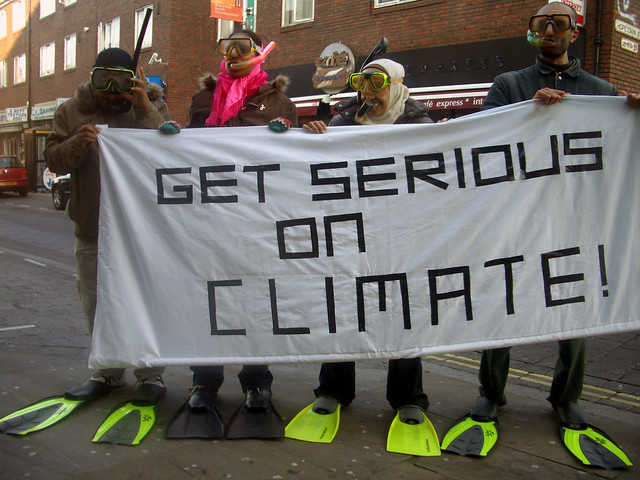 My formal exploration of permaculture, in 2008, began after I had already helped initiate what was the UK’s first local Islamic ecological activist group four years earlier.
My formal exploration of permaculture, in 2008, began after I had already helped initiate what was the UK’s first local Islamic ecological activist group four years earlier.
Initially named the London Islamic Network for the Environment, the group’s name changed to Wisdom In Nature (WiN), and over the years we began to specialise in delivering trainings on Islamic ecology, Permaculture, and Inclusive Leadership. These trainings are now offered to both organisations and individuals.
The unique identity of our change-making group, which wasn’t formally part of a larger body, meant that we had to figure out quite a few things ourselves.
While this presented us with many challenges, it also gave us freedom and opportunity (the permaculture principle, ‘The problem is the solution’, comes in here) – the opportunity to tread off the beaten track.
With this freedom, we simultaneously drew on many available resources outlining group-work approaches published by a range of change-making networks, including more radical ones. This helped us move into an embodiment of ways of working that were less likely to replicate aspects of mainstream structures we believed to be part of the problem.
We made an impact very soon after forming, and became known quite rapidly amongst ‘environmental’ groups, especially after we organised a stunt on Brick Lane that was covered by the Guardian newspaper.
Small and slow
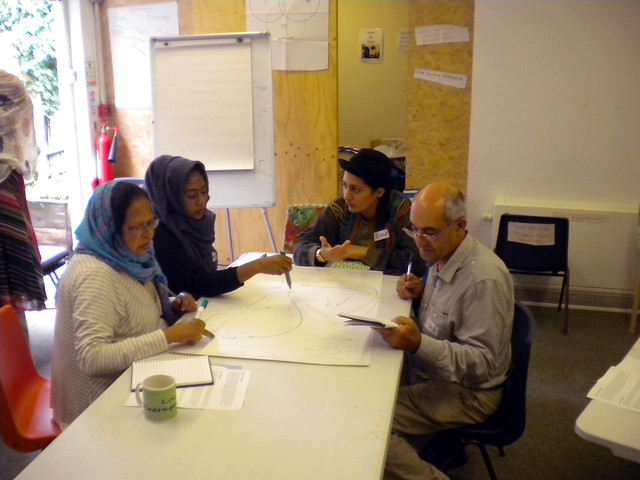 What was heart warming about permaculture in all of this, was it’s affirming and validation of some of the ways our group, Wisdom In Nature (WiN) was already beginning to work (albeit with birthing pains!).
What was heart warming about permaculture in all of this, was it’s affirming and validation of some of the ways our group, Wisdom In Nature (WiN) was already beginning to work (albeit with birthing pains!).
One of the qualities we had already brought into our work was ‘reflection’: Awareness, Reflection, Action was already the tag line on our website. We placed much emphasis on process, on how we did things, rather than only on what we did.
Through going slow while creating the space and listening culture to talk openly about how things were going and being experienced - we had already quickly learnt not to mindlessly rush to make decisions, and instead to go wider and deeper. This was helped with the presence of thoughtful members such as Elizabeth Lymer, Shumaisa Khan, Wasi Daniju and Lali Nisa.
By intentionally taking in different voices, we were able to better hear the perspective of the diverse elements in the social landscape. Thus, rather than grabbing any dazzling opportunity that jumped in front of us, we would instead hold space for conversations and allow time to reflect. What was needed would then more naturally emerge, rather than be forced by surface level pressures.
Shared energy and collaborations
At Wisdom In Nature, we were very fortunate to have had group facilitation trainings with experienced trainers who are current members of Navigate and Rhizome. Additionally, we drew on resources provided by Seeds for Change and People and Planet amongst others.
My own journey with group work and facilitation developed considerably through these beneficial interactions and on-the-ground experimentation. I began to love the role of facilitating meetings and workshops.
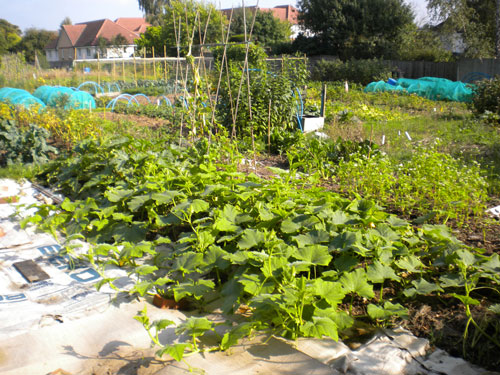 Over the following years I also went through a number of week-long intensives in conflict transformation and community building using Process Work, elements of which I find add much potency when applied to group processes and workshops.
Over the following years I also went through a number of week-long intensives in conflict transformation and community building using Process Work, elements of which I find add much potency when applied to group processes and workshops.
Permaculture itself also inspired me into food growing: initially a few indoor plant pots, then a small space in our garden, and then when we moved into a garden-less flat, an allotment project became a formal design as part of my permaculture diploma.
Over time, a couple of team members within Wisdom In Nature also completed their Permaculture Design Course. As we collaborated together and gained experience applying permaculture, we began to feel comfortable enough to design basic trainings ourselves.
We started with introductory trainings that wove permaculture with either Islam, or Sufism. Sufism is an approach within Islam that intentionally emphasises the experiential or inner dimension.
Our initial such training was probably the first training on Islam and Permaculture anywhere in the world, back in 2010.
We were always rewarded by the positive response from participants. We enjoyed witnessing how over the course of the training, participant’s would step into a place where the interconnectedness of life was more fully appreciated, a place where they felt more empowered to make a difference, and where – for those of the Islamic faith – they felt more intimately connected to their own spiritual tradition.
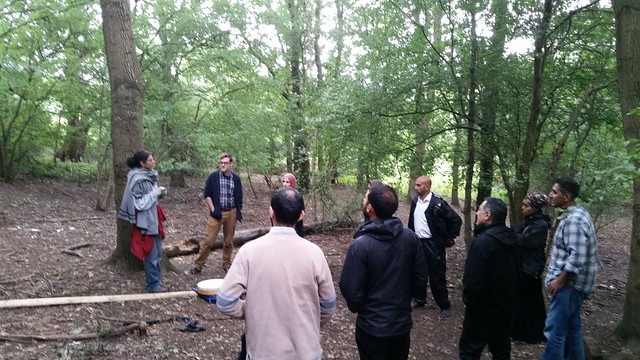 The success of these courses was only possible through partnerships, such as with the Inclusive Mosque Initiative, Transition Town Tooting and Rumi’s cave, all in London, as well as Al-Meezan in Glasgow.
The success of these courses was only possible through partnerships, such as with the Inclusive Mosque Initiative, Transition Town Tooting and Rumi’s cave, all in London, as well as Al-Meezan in Glasgow.
We also facilitated what turned out to be an extremely lively Sufism, Islam and Permaculture taster at the London Permaculture Festival in 2013, which was attended by almost 100 people.
Additionally, we wove elements of permaculture into an Inclusive Leadership Retreat for Muslim change-makers in 2017 at Gilwell Park (coincidentally where the International Permaculture Convergence had taken place a couple of years earlier!). We had been invited to lead this training by the charity, the Aziz Foundation .
Recently we’ve also been getting interest from Muslims in cities who are wanting to transition to a more intentional, community-based and nature centred way of being.
Gaps in our thinking: Pathway to resilience
We’ve stumbled many times along the way, and sustaining and growing our work has been particularly challenging. A key limitation is that we’ve been running on a shoe-string budget. Our day-to-day activities have been powered mostly by the passion of team members with some income from our courses.
There’s definitely a gap in our design thinking here, and the need for us to reflect on applying the permaculture principle of Obtain a yield, from the financial perspective. This is going to need active attention if we are to sustain and thrive. In fact, I see as I write this that a permaculture design to help ensure we draw adequate financial nourishment feels called for.
Enter COVID: Transformation through virtual space
In this COVID-affected world, more of WiN’s activities have also shifted online. We have started hosting regular zoom forums on different themes, such as Islamic Cosmology, Traditional Story-telling, and Regenerative Communities – these gatherings include breakout-group sharings and moments of silence. These elements help support rich conversations and the possibility of transformation for participants.
Some of Wisdom In Nature’s current key goals include:
- expanding our team: we welcome those passionate about permaculture and conscious group work
- increasing our donations base (primarily through supporters happy to set up standing orders), and
- offering more pathways for organisations and individuals to learn permaculture and regenerative solutions through trainings and collaborations
We continue to collaborate with a wide range of organisations, and are feeling called to step up more fully and courageously to the calling that is pulling so many more of us to co-create wholesome systems, structures, and ways of working, at this pivotal time we collectively find ourselves in.
Anyone for whom our work and way resonates is welcome to reach out to us to explore collaborations or for enquires. It’s easy to drop a message via our website [www.wisdominnature.org], which we very much look forward to receiving and responding to. We also have a newsletter which anyone can subscribe to through the above link.
In Peace,
Muzammal Hussain ~ Wisdom In Nature
© Muzammal Hussain
All Images ©Wisdom In Nature
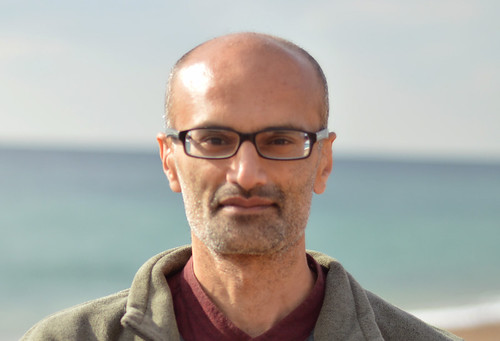 Muzammal Hussain is passionate about 'Wholeness' and the relationship between the inner and the outer. He is an emotional healing Journey therapist at www.restorativewholeness.com, a medical doctor (having worked in NHS Psychiatry), and also initiator of the Islamic ecological training and change-making group, Wisdom In Nature (WiN): www.wisdominnature.org. WiN weaves together the powerful blend of Islamic ecology, Permaculture and Conscious Group Work and works within a ‘five-strand activism’ model.
Muzammal Hussain is passionate about 'Wholeness' and the relationship between the inner and the outer. He is an emotional healing Journey therapist at www.restorativewholeness.com, a medical doctor (having worked in NHS Psychiatry), and also initiator of the Islamic ecological training and change-making group, Wisdom In Nature (WiN): www.wisdominnature.org. WiN weaves together the powerful blend of Islamic ecology, Permaculture and Conscious Group Work and works within a ‘five-strand activism’ model.